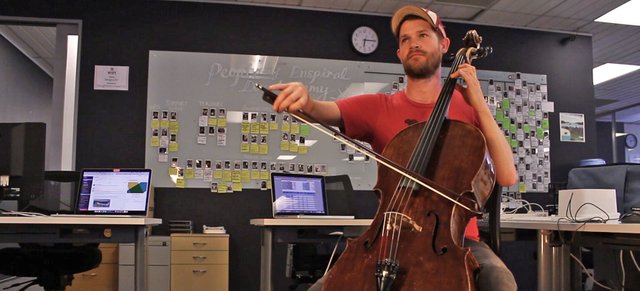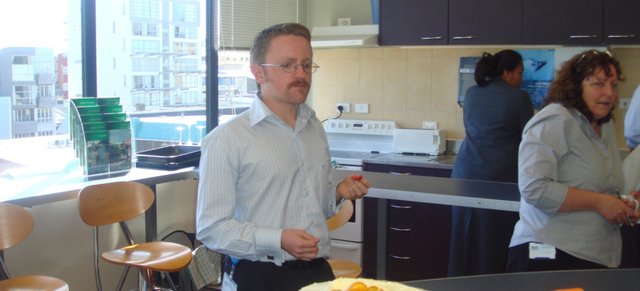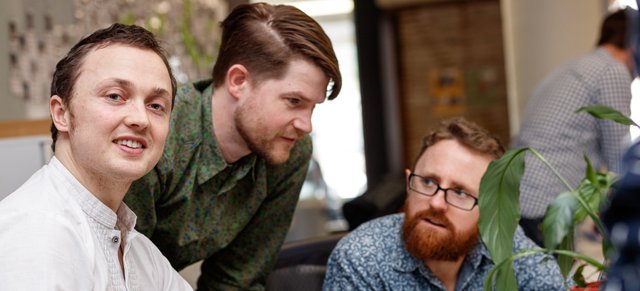Story by Rupert Snook, Malcolm Colman-Shearer and Charley Davenport; special guest Susan Basterfield

Chapter 1 — Malcolm, 2008
There was a dose of macabre pleasure in the stupid activity I was performing that day: my boss had asked me to print an unholy number of copies from a monthly report, so there I was waiting for the big printer to do my dark bidding. Someone had badly formatted the file — but only I seemed to notice. Every single copy came out pixelated, blurred and generally as ugly as if it was printed with a 1994 fax machine instead of this office behemoth right in front of me.
Yet, I was humming Bee Gee’s Staying Alive. That day, I really didn’t care, even managed to enjoy it.
In less than one week, I would quit.
Working for a bank is not as bad as it sounds. People were nice and honestly very professional. The end of the year bonuses are of course a welcomed plus. Yet somehow it felt like a job to please one’s mother, not oneself.
If you look for motivational speakers online, you’ll find a bunch of bank workers. Of course, they’ll only briefly mention the experience and focus on one specific moment: the day they quit. The interesting part is what comes next! When they became professional whale photographers or bungee jump firefighters.
Most of these superpeople seem to have some sort of “calling”. One might compare it to the great-great-grandson of old mysterious revelations like the three Wise Men following a star or Buddha facing mortality for the first time.
I didn’t have such narrative luxuries, though. All I had was a discomfort — a persistent mosquito-feeling that would bite me once or twice every week. It didn’t come with a form and a shape, just a general sensation that I could be better using my time and skills. It didn’t help (or it did help way too much) that my entrepreneur friends kept telling me to quit.
One day I sat down and calculated: if I quit just after the semester bonus, I could have enough to sustain me for one entire year. It was enough. That was my calling: “mister, you have exactly one year to figure it out” — one that I created myself.
Five years after I first joined the money overlords, I quit the cubicle.
Since Obi-Wan Kenobi didn’t knock my door offering adventure, I did the only sensible thing: I looked around.
I started going to meetups, asking friends, being introduced to people. I surrounded myself with good folks and they led me to good ideas: projects about treating people fairly, saving the environment, fighting colonialism. This is how I got to know this thing called Enspiral. If you follow the scent of meaningful work in Wellington, you’ll get to know it too. In time I’d join the group and even find several jobs working for companies affiliated with Enspiral, like Loomio and the Dev Academy.
In fact, at one point I realised I was a reference. I guess my organised mind was pretty valued in the tending-towards-chaos environment created around Enspiral. Too many big ideas keeping people always a little tipsy.
Joshua, the initiator of Enspiral himself and eventually my boss, saw something I didn’t. He noticed the value I generated for his company and realised it would be something valuable for Enspiral too. Eventually he sat down with me and my friend Phill to talk about his vision — he opened (or rather blew) our minds.
We were offered a problem to call ours. A system to build. Not a Lego box that comes with an instruction manual, but Play-Doh work. This confusion would greatly benefit from automation — and we were just the blokes to make it happen!
It was not a job and not a company, it was something else. It didn’t need a website, business cards, not even an official name. It relied on the collective decision and collective generosity of people from this crazy network — and they never failed to deliver. All the pieces were there, we just needed to put them together. Everything was possible.
We didn’t know if we had a business — but we had something. Something full of people.

Chapter 2 — Charley, 2015
Whenever you apply for a new job you always have this basic notion that the description you’re reading is not going to be exactly the environment you’ll encounter. You know, the map is not the actual land.
But how wrong can you be?
I had replied to a pretty normal job ad for "Administration Superstar" — which sounds cool but honestly all sorts of companies were posting jobs like “Marketing Ninja” or “Office Hero” without expecting you to spy on enemy clans or slay hydras; so you had to approach those names with caution and even a pinch of skepticism. Malcolm liked me, I was onboarded.
First week in, I had this eerie sensation of exploring a ship’s kaleidoscopic engine room without ever hitting the deck. It was interesting, if not a little overwhelming. I could understand the systems when they were explained to me, but couldn’t quite imagine how the whole thing looked like.
The interesting (and complicated) part of the work was that we were actively trying to listen to people’s needs. Sometimes a lot of people needed the same sort of service. Many times, we had individual cases: this guy moved to Vietnam and now his taxes are tricky, this lady has a spam filter so voracious that not even her mom can send her an email, this person went for a 45 day silent retreat — which somehow includes silence in text messages as well.
That might sound nightmarish, but honestly it was fun. A chunk of my work was to sit down with people and listen to their stories — “what do you mean you’re averse to any Google products? Oh I see now, that’s wacky!” Little by little I got to know the people I was working for and soon enough I realised they were in fact the deck of the ship — and it was a beautiful and weird ship.
The personalized work was clearly valued: I had extra tasks but also extra hugs. At some point I realised I was pretty known already. At some other point I realised I was being invited to a lot of Enspiral birthday parties.
I remember sitting down cross legged in our summer retreat. The wide tent was lit by just a dozen candles, giving it a dreamlike aspect. It was supposed to be our last activity after three days of mingling — it was called a Story Circle.
Whoever felt drawn could go to the middle and tell a story. Simple as that. The first maybe four minutes were silent, but then somebody stood up, sat down in the middle and started talking about a teenage broken dream.
No, not someone: Dan! I know this guy! This next girl as well. And the next one.
The stories went one by one and I realised: I knew most of these people. After hearing their tales, I even felt I knew them more, I knew something precious about them.
This ship didn’t really have a deck — at least not the crisp picture one might expect.
But if anybody asks me to imagine one: I picture a dimly lit tent where people feel free to open their hearts and everybody else feels free to listen.
What a weird job.

Chapter 3 — Malcolm, 2015
Remember when Joshua inebriated me with the thought that “everything was possible”? Well, perhaps the ifs made me so optimistic that I forgot to properly weight the whens. We had estimated 6 months, now 2.5 years had passed and not everything was fully operational.
Phil was gone. In fact, many people have come and gone and still the tasks kept piling up to infinity.
The complications were so many and so frequent that I would have stress dreams. The stress dreams would gift me with headaches. The headaches would decrease my productivity. The unfinished tasklists would give me more stress dreams. The sum of many smaller inconveniences and worries felt like I was carrying an orangutan on my back everywhere I went.
It’s true that the same community that was giving us all this trouble was doing its best to help us as well. By that time our team had not only Enspiral, but some Enspiral-affiliated companies as clients — and we were just shaking hands with our first out-of-the-network contract. Felt weird, like the orangutan bringing me some bananas.
But still I’d see the problems piling up and no matter how many meetings and Trello boards we had, I felt it was never enough. Sometimes I felt it could never be enough.
Then one day, in the middle of a mildly warm shower, I had a thought that changed everything: a self-help thought. Not that I am super familiar or even fond of self-help books, it just occurred to me! Its self-helpness was so latent that I remember thinking “oh this is how those books are born.”
The thought I had was: “we’re optimising all those systems here and there — but we’re not optimising ourselves.”
Pretty cheesy. Undeniably true.
But how could we do it? We’re email wizards, spreadsheet connoisseurs. Optimising human systems was new and frankly exciting. Where to start?
I guess the first really useful idea — the guiding force we used to carry the next few steps of the process — was this very easy and very hard question: what are we doing this for again? What’s the end goal? This work was not intended to make rivers of money, if so we’d have better options. It was clearly not a charity as well, it paid our bills.
Eventually, after a couple of brain-splitting conversations, we got to a place that I really liked: we were doing this to take care of ourselves, inside and outside of the office. It was our livelihood, so it might as well be a really great one.
We still didn’t have a name or a website, but we had a powerful idea.

Chapter 4 — Rupert, 2016
The new job was pretty sweet but something was out of place.
Not that I was mistreated or anything! Malcolm and Charley were always the warmest people and it really felt they were on my side. Ready to help, ready to care.
The true problem was about the work itself. You see, I was hired to do a little bit of sales, a little bit of customer support for one of their biggest clients. Yet, after a while I caught myself strategizing ways to make things do themselves. I guess it was Malcolms’ automation talk that put my brain into this state — so I’d propose those ideas and the two fellas would not only approve it, but stimulate me!
I’d spend a little more time building a system and then never again touching that part of the work, the bots did it themselves. I can’t describe how satisfying this felt! I admit I have imaged Malcolm wearing a trenchcoat and telling me “hey kid, wanna buy some automation?” Anyway, I was hooked.
While this happened, a wild thought was starting to click — and I think it was clicking in everybody’s brains at the same time, but in mine just a tad quicker.
How do you tell your boss that your project, if successful, will… turn his job redundant? How do you fire your boss?
(Does this mean you also fire yourself by extension?)
So one day I sit down with Malcolm and tell him about my very verifiable theories. When I started explaining my case, I can see by his facial expression that he had gotten to the same conclusions as I did — but when I get to the specific part that he’d lose his job, something changes. I guess his eyebrows didn’t really know where to go, so they just bobbed around aimlessly. I waited a bit.
The first thing he said was that I was doing everything right and that making his work redundant was a positive and welcomed outcome of my work. He made sure to tell me he was not mad or disappointed.
I was reassured, but I also had this strange feeling — like a forest fire being consoled by the forest.
I was surprisingly wrong.
Later I found out that Malcolm was three steps ahead of me: my comment about him losing his job had catapulted him into thinking of the big picture. All those little automations we were brewing were not specific to this particular situation. While I was seeing this whole experience as my job, he started to frame it as a lab experiment — creating tools we could use again and again.
If we could make Malcolm redundant for this scenario, we could make infinite Malcolms redundant everywhere. We’d fire him countless times. I had this strange feeling that he was ceremonially passing me his trenchcoat.
Eventually we had to sit down to have the conversation. He told me:
— Rupert, you did it. I basically don’t have any more tasks now, it’s all automatic. I think there’s only one sensible thing to say: do you want to join the team for good?
The team didn’t have a real name, or a website, or business cards. But it had a Malcolm-replacing machine that I had helped (if not leaded) creating. It didn’t feel like I was being hired or I was being offered equity in a business — the contracts and handshakes would come, but more as a formality than anything.
It felt more like an initiation ritual. I had climbed the snowy peaks and brought back the blue lily as a sign of my commitment.
I accepted.

Chapter 5 — Susan, 2017
Everybody in Enspiral loves the boys and that includes me. I’m calling them the boys because they had different names over the years.
The addition of this new guy, Rupert (yes, he was immediately beloved as well, no surprises here), had added some electric energy to their microcosmos. The fella had fire in his veins. Good.
They sent me an email and scheduled a meeting. I greeted them in a well lit office room in the center of Wellington. Most of my clients try their best to have their homework done before our meetings, but few have their shit as together as these guys. It was cliché business strategy work: let’s calculate the hours and the dollars, then we see how much they can dance before they tire. The vibes were amiable, even too nice one might say. Everything was progressing smoothly.
Look, I’ve been doing this for many years. When somebody asks me how to make this or that number go up, I have a good grasp on the machinery — but that’s not the only tool in my shed.
I noticed it once: Rupert thought Charley was supposed to do something he hadn’t done. It was not presented as a rebuke, oh no! They were nice (too nice) to each other, both apologized and the meeting carried on. Then Charley thought Malcolm was responsible for one other thing. By the third time, my spider sense was tingling.
— Listen, boys, I have a hunch here: let’s schedule another meeting. You don’t need to prepare anything this time.
The following week I gave them a bunch of blank playing cards. The exercise was simple: they’d write all the roles, all the functions the team needed to perform to stay afloat.
They wrote around 30 roles on the cards, thorough and detailed. To be expected.
Then I asked them to distribute the role cards, so we’d know who was responsible for what. Again: I’ve been doing this for many years, so I knew what was about to happen. A good six role cards remained in the middle.
Malcolm’s eyebrows narrowed. Rupert’s eyes went a bit wider. Charley made a “mh” sound. Ladies and gentlemen, the soup had been stirred.
Right there and right then the bulk of my work was done — I’d stick around for the details, of course, but at this point the David statue could be seen in the marble block. Yet, I still had one last ace to play.
They listened intently when I talked about roles. I challenged them not only to grab the responsibilities they were good at, but also the ones at the edge of their personal development. I made sure to mention that too nice might turn into a problem.
They said they needed time, so I gave them time.
When I came back, the scene was different. They got to the same conclusion that many groups do: what is the point of this CEO title if I don’t really get their roles out of the name? The team decided to restructure and become a worker-owned company. To me, it sounded like a good fit.
But they went one step ahead: they took my process and decided to adopt and foster it. They presented me with a new technology: good accountability questions, designed to measure the work and also fight the too-nice-effect. I was delighted — to this very day I’m still using their process myself with my new clients.
The organisational spirits had spoken, the ritual was almost complete.
All they needed now was a name.

Chapter 6 and Finale — Charley, 2018
I do remember passing through the strange process of firing myself — and immediately rehiring myself, but this time as one of the partners. It was my function to deal both with onboarding and wrapping up, so it ended up being pretty meta.
This felt right. In fact, it felt like the kind of strange thing our Enspiral tribe did, even with its odd features: a CEO who decided that it’s better if we operated as a worker-owned collective, so he dissolves his powers. A group of people who everyone cared about and kept sending clients to, even if we didn’t even have a website to show our work. An important meeting deciding how much we should be paid that took twenty minutes more than it should because all the partners kept saying “no, you should get more”.
You hear those Steve-Jobbiesque stories about the founder with an idea — an idea to shake the world. That’s not our case at all: we were attuned to our surroundings, we listened to people. We'd make longer term plans, reality would have other ideas, and we'd happily accept that.
Come to think of it, I don’t think we ever chose to have a business together, I think this just emerged as a natural consequence of the things happening around us — and particularly the thoughtful and kind people around us, who made us want to work, want to engage, want to contribute. Want to care. We found this company-sprout in our back garden, we just bothered to water and trim it.
Now, after 4 years, we finally have a website — and gods! We have an official name: Optimi! It feels naive to celebrate a name after all those years working together, but to us it is a big deal. We can fire so many Malcolms now, automating tedious processes for people all around the world.
In our hearts we know — if tomorrow we lose our website, name, business cards or any of those pieces, we have everything we need to start it all over again.
We have people who care.

This story is part of the Enspiral Story Dojo, a place of tales about practice and transformation into a life with more meaningful work.
This tale was about (and co-written by) the amazing people from Optimi, a coop focused on admin automation. Narrative support by Joriam Philipe, Enspiral catalyst.
If you’re curious about Enspiral and its participants, you can read more here or support the network.